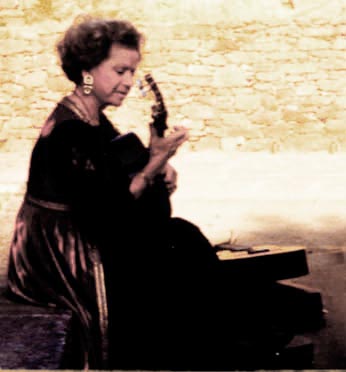
|
| Flory Jagoda |
|
| December 6, 2008 • Glenn Gould Studio • Toronto |
|
|
|
|
|
|
Traditional Spanish, but from Sarajevo, and by Jews
by Tova G. Kardonne |
| Suffice it to say that by the time Flory Jagoda brought it to the Glenn Gould Studio on the sixth of December, care of Ashkenaz: A Festival of Yiddish Culture, it had seen the world. 'It' being the traditional repertoire of songs that some of the Jews of Spain, fleeing the Inquisition, had brought with them to Sarajevo. The language of the songs is sometimes Serbo-Croatian, but most often Ladino, a tongue derived from Castilian and Hebrew with some Turkish and Arabic; the Yiddish of the warmer climes. |
| Jagoda sang of daughters locked away from the ardent young upstarts who pursue them, of the rescue of a beautiful kidnapped maiden, of Sabbath prayers for peace and health, of wives left behind by husbands gone to war, in short, of the joys and pains of a Jewish community in 15th century Spain, transposed to Bosnia. She also sang laments of longing for Spain. One, “La Yave de Espanya,” whose title means “The Key From Spain,” refers to the locked Synagogues and houses left behind, the keys to which were brought to Sarajevo and treasured, as families awaited the day they would be able to return and open them up again. The octogenarian Jagoda has herself played a significant role in preserving these songs from extinction, as the Spanish-Jewish community of Sarajevo was destroyed in the Holocaust. Jagoda survived by escaping to Italy from an internment camp on an island off the Dalmatian Coast, to become one of the few people in the world who remember that community at all. |
|

Flory Jagoda |
|
| Old Spanish, Hebrew, Serbo-Croatian: this fusion was born of circumstances which are still the norm across much of the globe, where cultures tend to remain distinct unless brought together forcefully under troubled conditions. And as in the case of such fusions, the hybrid art form constitutes a heartbreaking and magnificent attempt to make lemonade from the bitterest fruits of bigotry. In practice, the sound is fascinating. Even for those who are relatively familiar with related genres, this typical folk-tune repertoire of song-forms benefits from several unexpected twists. The Spanish love-ballads using Balkan-influenced modes, or the happy Western European melodies overlaid onto a brisk Eastern 7/8 short-short-long dance-feel, make for both a fun evening and an ethno-musicological intrigue.
Jagoda’s voice is gentle and clear, hitting pitches in the centre and, obviously, capturing the mix of idiomatic inflections with perfect authenticity. Her accompaniment by two guitars (Howard Bass, Susan Geata), plus Jagoda’s own guitar, with accordion (Milos Popovic), mandolin (Eric Stein) and violin (Aleksandar Gajic) was pleasant, due to the high caliber of the musicians on the stage, but under-arranged and under-rehearsed. Everyone kind of jammed along a lot of the time, which, with so many chord-playing instruments occupying an overlapping range of pitches, resulted in a timid sound and a lack of intensity. One to watch is Susan Gaeta, one of the guitarists, who also sang back-up vocals, and whom Jagoda introduced as her apprentice. Gaeta sang lead vocals on one tune. Her liquid alto voice and fluent comfort in the idiom makes it an exciting thought that she will carry this music forward to another generation.
Scattered among the traditional tunes were a few of Jagoda’s own compositions. One that I particularly appreciate is “Ocho Kandelikas;” you guessed it, a Hanukkah song about “Eight Little Candles.” Aha! I thought, that’s what all the other Hanukkah songs called “Eight Little Candles” were missing: Spanish-Bosnian fusion influences! Because this one, I must say, is far and away the grooviest tango-esque eight-little-candles-song I’ve heard yet. For fans of Spanish, Jewish, or Balkan music, the ethno-musicologically enthused, and also those looking for a non-cheesy song about the Hanukkah candles, CBC Radio 2 will be podcasting the entire concert online from December 21st, the first night of Hanukkah. It’s a strange and marvelous state of affairs, that we, a generation after her culture was obliterated, can listen to the music from the unique and ultimately doomed community of Flory Jagoda’s birth.
|
|
|
|
|
|


